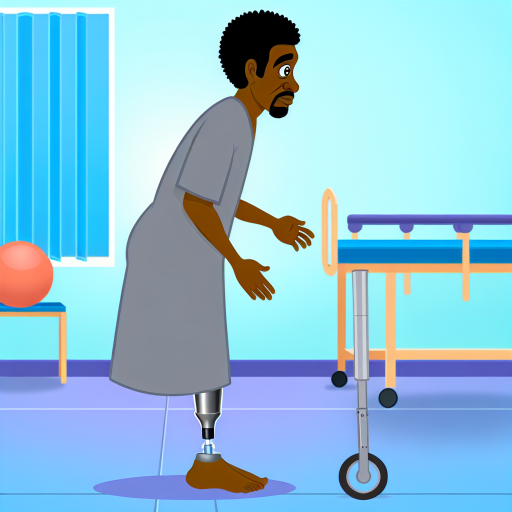Introduction
Blood disorders are medical conditions that affect the normal functioning of the blood in the body.
Brief Overview of Blood Disorders
Common blood disorders include anemia, sickle cell disease, and hemophilia, among others.
Importance of Understanding Common Blood Disorders in Nigeria
It is crucial to understand these disorders in Nigeria due to their high prevalence.
By recognizing symptoms early, individuals can seek appropriate medical care and treatment.
Increased knowledge can lead to better management of blood disorders and improved quality of life.
Understanding common blood disorders can also aid in preventative measures and genetic counseling.
Public awareness and education are essential to reduce the burden of these disorders in Nigeria.
Common Blood Disorders in Nigeria
Blood disorders are a significant health concern in Nigeria.
Various types affect the population.
Here are some common blood disorders seen in Nigeria:
- Sickle Cell Anemia
- Malaria-Induced Anemia
- Hemophilia
- Thalassemia
- Sickle Cell Trait
Sickle cell anemia is a genetic blood disorder that affects hemoglobin.
It causes red blood cells to become sickle-shaped.
This shape makes it difficult for the cells to carry oxygen.
This leads to severe pain crises and organ damage.
Malaria is a prevalent disease in Nigeria.
It can lead to anemia when the malaria parasite infects red blood cells.
This infection causes them to rupture and die.
This results in a decrease in red blood cell count and hemoglobin levels.
Hemophilia is a rare but serious blood disorder.
It impairs the blood’s ability to clot properly.
People with hemophilia may experience prolonged bleeding after an injury.
Sufficient management is crucial to avoid complications.
Thalassemia is another genetic blood disorder.
It affects the production of hemoglobin, leading to anemia.
People with thalassemia may experience fatigue and weakness.
Their skin may appear pale due to a decrease in healthy red blood cells.
Sickle cell trait differs from sickle cell anemia.
It carries only one abnormal gene instead of two.
People with sickle cell trait usually do not experience symptoms.
However, they can pass the gene on to their children.
In Nigeria, these blood disorders pose a significant burden on healthcare.
They impact the overall well-being of the population.
Understanding common blood disorders helps in early diagnosis.
Proper management is essential to improve outcomes.
If you suspect that you or a loved one may have a blood disorder, seek medical advice.
Accurate testing is necessary for proper diagnosis and treatment.
Causes of Blood Disorders in Nigeria
Factors contributing to the prevalence of blood disorders in Nigeria.
- Poor nutrition due to lack of access to balanced diets
- High rate of infectious diseases such as malaria and typhoid
- Lack of adequate healthcare facilities and resources
- Environmental pollution leading to toxicity in blood
- Insufficient awareness and education about blood disorders
Environmental, genetic, and lifestyle factors influencing the development of blood disorders.
- Exposure to harmful chemicals in the environment
- Genetic predisposition to certain blood disorders
- Unhealthy lifestyle choices such as smoking and excessive alcohol consumption
- Chronic stress and lack of physical activity
- Poor sanitation and hygiene practices
These factors collectively contribute to the high prevalence of blood disorders in Nigeria.
Addressing these issues through public health interventions and education can help reduce the burden of these conditions on the population.
Transform Your Career with Expert Guidance
Get personalized mentorship consulting that’s tailored to your unique path. Our expert advice is actionable and exclusive.
Get StartedSee Related Content: Overview of Veterinary Regulations in Nigeria
Symptoms and Diagnosis
When it comes to blood disorders, it’s crucial to be aware of the common symptoms that may indicate a problem.
Common Symptoms of Blood Disorders to Watch Out For
- Fatigue and weakness: Feeling tired constantly could be a sign of an underlying blood disorder.
- Shortness of breath: Difficulty breathing can be a symptom of certain blood disorders affecting oxygen transport.
- Pale skin: A lack of healthy red blood cells can result in pale or jaundiced skin.
- Unexplained weight loss: Sudden weight loss without a change in diet or exercise could be concerning.
- Easy bruising or bleeding: Blood disorders can impair clotting function, leading to easy bruising or prolonged bleeding.
- Recurrent infections: A weakened immune system from certain blood disorders may result in frequent infections.
Importance of Early Diagnosis and Treatment for Blood Disorders
Early diagnosis is key when it comes to blood disorders as it can significantly impact treatment and prognosis.
- Timely intervention: Detecting a blood disorder early allows for prompt treatment to prevent complications.
- Improved outcomes: Effective management of blood disorders early on can lead to better patient outcomes.
- Quality of life: Early diagnosis and treatment help maintain a higher quality of life for individuals with blood disorders.
- Prevention of complications: Identifying and managing blood disorders early can prevent serious complications from arising.
- Individualized care: Early diagnosis allows for personalized treatment plans tailored to each patient’s specific condition.
Being vigilant about symptoms and seeking medical attention for any concerns can make a significant difference in the management of blood disorders.
Delve into the Subject: Innovative Mental Health Programs in Nigeria
Treatment and Management
When it comes to treating and managing blood disorders in Nigeria, there are several options available to patients.
It is crucial for individuals with blood disorders to receive proper treatment and follow-up care to ensure their well-being.
Overview of Available Treatment Options
- Medication: Doctors may prescribe medications to help manage symptoms and improve blood counts in patients with blood disorders.
- Blood transfusions: For some blood disorders, such as anemia or clotting disorders, blood transfusions may be necessary to replenish blood cells.
- Bone marrow transplant: In more severe cases, a bone marrow transplant may be recommended as a treatment option to replace damaged or diseased bone marrow.
- Surgery: In certain cases, surgery may be required to remove spleen or lymph nodes affected by blood disorders.
Importance of Proper Management and Follow-up Care
- Regular monitoring: It is important for individuals with blood disorders to undergo regular check-ups and blood tests to monitor their condition.
- Diet and lifestyle changes: Following a healthy diet and lifestyle can help manage symptoms and improve overall health for patients with blood disorders.
- Compliance with treatment plan: Patients must adhere to their treatment plan as prescribed by their healthcare provider to ensure optimal management of their blood disorder.
- Support and counseling: Emotional support and counseling can be beneficial for individuals coping with the challenges of living with a blood disorder.
With proper treatment and management, individuals with blood disorders in Nigeria can lead fulfilling lives.
It is essential for patients to work closely with their healthcare providers and adhere to their recommended treatment plans to effectively manage their condition.
You Might Also Like: Case Studies of Preventive Medicine Success in Nigeria
Prevention Strategies
Strategies to prevent blood disorders in Nigeria
-
Promote Healthy Lifestyle: Encouraging healthy eating habits and regular exercise can help prevent some blood disorders.
-
Regular Medical Check-ups: Routine health check-ups can detect early signs of blood disorders and lead to timely treatment.
-
Avoid Harmful Practices: Discouraging harmful practices like substance abuse and unsafe blood transfusions can prevent certain disorders.
-
Immunization Programs: Ensuring widespread immunization against diseases that can cause blood disorders is crucial in prevention efforts.
-
Genetic Counseling: Providing genetic counseling services can help individuals understand their risk of inherited blood disorders.
-
Health Education: Implementing community health education programs can raise awareness about blood disorders and preventive measures.
Importance of public health initiatives and education on blood disorder prevention
-
Early Detection: Public health initiatives play a key role in early detection of blood disorders through screening programs.
-
Reduced Morbidity: Education on prevention can lead to a reduction in the incidence of blood disorders and associated health complications.
-
Cost-Effectiveness: Prevention strategies are cost-effective in the long run compared to treating advanced stages of blood disorders.
-
Improved Quality of Life: By preventing blood disorders, individuals can lead healthier lives and avoid chronic health issues.
-
Community Well-being: Public health initiatives benefit the community by promoting overall well-being and reducing disease burden.
-
Empowerment: Education empowers individuals to take control of their health and make informed decisions regarding preventive measures.
Explore Further: Top Restorative Dentistry Clinics in Nigeria

Impact on Individuals and Communities
When it comes to blood disorders, the impact extends beyond just the individual affected.
Families, communities, and society at large feel the effects in various ways.
Effects of Blood Disorders on Individuals and Families
- Physical and emotional strain on the individual with the blood disorder.
- Financial burden due to the cost of treatment, medications, and hospital visits.
- Disruption of daily life and activities due to symptoms and complications.
- Increased stress and anxiety for both the individual and family members.
- Impact on mental health, including depression and feelings of isolation.
Overall, blood disorders can take a toll on the affected individual and their family.
This affects their quality of life and overall well-being.
Social and Economic Impact of Blood Disorders on Communities in Nigeria
- Lack of awareness and education leading to delayed diagnosis and treatment.
- Stigmatization and discrimination against individuals with blood disorders in the community.
- Reduced productivity and economic burden due to sick days and hospital visits.
- Increased healthcare costs for the community as a whole to manage blood disorders.
- Strain on healthcare facilities and services to accommodate the growing number of cases.
These social and economic impacts create a ripple effect within communities in Nigeria.
This affects individuals, families, and the overall well-being of society.
Support and Resources
Living with a blood disorder can be challenging.
However, there are support networks and resources available in Nigeria to help individuals cope with their condition.
- Support Networks: There are various support groups and organizations dedicated to helping individuals with blood disorders in Nigeria. These groups offer emotional support, education, and advocacy for patients.
- Community Support: Local communities often come together to provide assistance and resources for individuals living with blood disorders. This support can include financial assistance, access to medical care, and social support.
- Healthcare Professionals: Seeking help and guidance from healthcare professionals is crucial for managing blood disorders. Doctors, nurses, and other medical professionals can provide valuable information and treatment options for patients.
- Specialized Clinics: There are specialized clinics and hospitals in Nigeria that focus on treating patients with blood disorders. These facilities have the expertise and resources to provide specialized care for individuals with these conditions.
- Online Resources: The internet is a valuable resource for individuals seeking information and support for their blood disorder. Online forums, websites, and social media groups can connect patients with others facing similar challenges.
- Financial Assistance: Some organizations in Nigeria offer financial assistance programs for individuals with blood disorders. These programs can help cover the cost of medication, treatment, and medical expenses.
It is important for individuals with blood disorders to seek help and guidance from healthcare professionals and organizations.
These resources can provide essential support, information, and treatment options to help patients manage their condition effectively.
Understanding Blood Disorders in Nigeria
Recap of key points discussed in the blog post:
In this blog post, we have explored several common blood disorders prevalent in Nigeria.
Sickle cell anemia, hemophilia, and thalassemia can significantly impact the quality of life of affected individuals.
We have also highlighted the importance of early detection, genetic counseling, and management strategies.
Awareness and education are crucial in improving the overall health outcomes for those affected.
Call to action for increased awareness and understanding of blood disorders in Nigeria:
It is essential for healthcare professionals, policymakers, and the general public to unite.
By increasing awareness and understanding, we can collectively address blood disorders in Nigeria.
Through education, screening programs, and support services, we can improve the lives of individuals affected.
Collaboration can enhance diagnosis, treatment, and support systems for those living with blood disorders.
Let us continue to raise awareness, advocate for resources, and promote a better understanding.




